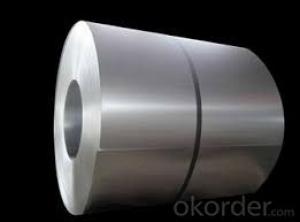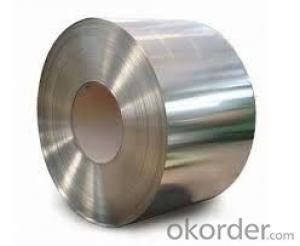Excellent Cold Rolled Steel Coil- -SPCG
- Loading Port:
- Tianjin
- Payment Terms:
- TT OR LC
- Min Order Qty:
- 30 m.t.
- Supply Capability:
- 5000000 m.t./month
OKorder Service Pledge
OKorder Financial Service
You Might Also Like
Description:
Quality of the goods could be guaranteed. The finished product has a variety of excellent capabilities, such as continuous rolling, degreasing, annealing, skin pass, slitting and cut to length line etc. Along with it many rocessing capability and smooth, flat surface. It’s widely used in outdoor and interior decoration, furnishing
Specification:
COLD ROLLED STEEL | |
Thicknenss | 0.10mm-4.00mm |
Width | 600mm-2000mm |
Sheets length | 1200-6000mm |
Coil inner diameter | 508-610mm |
Surface treatement | matt finish/bright finish,oiling/dry, bright anneal/black anneal |
Coil weight | 3-5t |
Application:
Widely used in electronic production, Motorbike, Automobile, Stamping structure; Cold bent Steel; Saw flake and etc; which is a good substitute for cold Roller and Cold plate in many field.
Images:
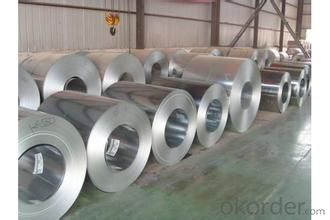
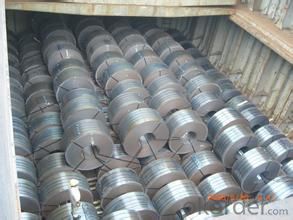
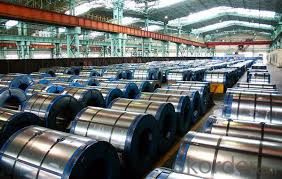
Package & Delivery
Package details: Standardseaworthy packing for international delivery.
Delivery: According to theexact quantity of your order.
Our products enjoy an excellent reputation and have been exported to Europe, South-America, the Middle-East, Southeast-Asia, Africa and Russia etc.. We sincerely hope to establish good and long-term business relationship with your esteemed company.
- Q:How are steel coils used in the production of electrical transmission towers?
- Various methods are employed in utilizing steel coils for the manufacturing of electrical transmission towers. Firstly, these coils are frequently employed in the production of the towers' structural components, including the main support columns and crossarms. To effectively bear the weight and strain of the transmission lines, these components necessitate strength and long-lasting durability, which steel coils aptly provide. Furthermore, steel coils are also instrumental in the creation of brackets and braces that reinforce the transmission towers. These particular elements contribute to the even distribution of the load and offer supplementary support to the structure. Steel coils can be molded and welded with ease, rendering them well-suited for the intricate fabrication of these components. Additionally, steel coils find extensive application in the construction of the foundation and anchor bolts that secure the transmission towers to the ground. It is vital for these bolts to possess robustness and resistance to corrosion, as they play a pivotal role in upholding the stability and integrity of the entire tower structure. To enhance their longevity and prevent rusting, steel coils are often subjected to galvanization or other protective coatings. In summary, the indispensability of steel coils in the production of electrical transmission towers arises from their exceptional strength, durability, and versatility. These coils enable the construction of robust tower structures capable of supporting the weight of transmission lines and withstanding diverse environmental conditions.
- Q:How do steel coils contribute to the sustainability of construction projects?
- There are several ways in which steel coils contribute to the sustainability of construction projects. First and foremost, steel is a highly durable and long-lasting material. Manufactured to withstand extreme weather conditions, corrosion, and other external factors, steel coils are ideal for construction projects that require strength and longevity. This durability reduces the need for frequent repairs and replacements, resulting in minimized waste and resource consumption over time. Moreover, steel coils are recyclable. Once their lifespan in a construction project comes to an end, steel coils can be easily and efficiently recycled. This recycling process requires less energy compared to the production of new steel, leading to reduced carbon emissions and environmental impact. Furthermore, the recycled steel can be utilized in various industries, including construction, thereby promoting sustainability and resource conservation. Additionally, steel coils contribute to the sustainability of construction projects by offering design flexibility. Being a versatile material, steel can be easily shaped, cut, and molded into different forms and sizes. This allows for efficient construction practices, reducing material wastage and optimizing resource utilization. Furthermore, the lightweight nature of steel coils enables convenient transportation and installation, further decreasing fuel consumption and associated greenhouse gas emissions. Lastly, steel coils contribute to the sustainability of construction projects through their energy efficiency. Being an excellent conductor of heat and electricity, steel is ideal for energy-efficient buildings. By incorporating steel coils into the construction of walls, roofs, and other components, buildings can be effectively insulated, resulting in reduced energy consumption for heating and cooling. Consequently, occupants benefit from lower energy bills, while the overall carbon footprint of the construction project is reduced. In conclusion, steel coils contribute to the sustainability of construction projects through their durability, recyclability, design flexibility, and energy efficiency. By utilizing steel coils, construction projects can minimize waste, conserve resources, reduce environmental impact, and optimize energy consumption, thereby promoting a more sustainable and eco-friendly approach to construction.
- Q:What are the different types of steel coil packaging machines?
- There exists a variety of steel coil packaging machines in the market, each serving a specific purpose. These machines are designed to package steel coils efficiently and effectively for storage, transportation, or distribution. Some of the available types of steel coil packaging machines are as follows: 1. Fully automated steel coil packaging machine: This machine is equipped with advanced technology and can handle large-scale packaging requirements. It wraps the steel coils with a protective layer of film or paper and can also apply strapping or stretch film to secure the coils during transportation. 2. Semi-automated steel coil packaging machine: This machine requires some manual intervention for loading and unloading the steel coils. It is suitable for medium to high-volume packaging needs and strikes a good balance between automation and cost-effectiveness. The machine typically employs a combination of wrapping, strapping, and shrinking techniques to package the coils. 3. Steel coil packaging machine with a vertical design: This machine is specifically designed for packaging vertical steel coils. It wraps the coils with a layer of film or paper and then applies strapping or stretch film to secure them. The vertical design facilitates easy loading and unloading of the coils. 4. Steel coil packaging machine with a horizontal design: This machine is ideal for packaging horizontal steel coils. It wraps the coils with a protective layer of film or paper and then applies strapping or stretch film to secure them. The horizontal design ensures convenient loading and unloading of the coils. 5. Customized steel coil packaging machine: Certain manufacturers offer customized packaging solutions tailored to specific requirements. These machines can be adjusted to accommodate different coil sizes, shapes, and packaging materials. They are designed to provide utmost flexibility and efficiency in the packaging process. To summarize, the different types of steel coil packaging machines encompass fully automated, semi-automated, vertical, horizontal, and customized machines. The selection of a suitable machine depends on factors such as packaging volume, coil orientation, and specific requirements of the steel coils being packaged.
- Q:For some reason, if you rub iron oxide or lodestone (both very crumbly, dark, mineral-like materials) into soft, unhardened steel, their particles actually get stuck into the surface of the steel (that is, darkening it). My question is, how does this work? How come iron oxide and lodestone can get stuck, and how come other materials (like silicone carbide, for example) do not?My second question is, are there any materials that can get stuck into steel, that is also blue in color, and how would I best obtain it?
- the coloured metals that u often see are anodised, which means that their surface has reacted with air to form a protective, porous oxide coating. because it is so porous, highly-concentrated dyes can be injected into them to colour them.
- Q:What are the cost considerations when purchasing steel coils?
- When purchasing steel coils, there are several cost considerations to take into account. Firstly, the price per ton of the steel coils is a significant factor. This can vary depending on factors such as the grade and quality of the steel, market demand, and supplier pricing. Secondly, transportation costs should be considered, as steel coils are heavy and may require special handling and shipping arrangements. Additionally, potential additional costs such as taxes, customs duties, insurance, and storage fees should be factored in. Lastly, the total cost of ownership, which includes factors like maintenance, repair, and energy consumption, should be considered to ensure a comprehensive understanding of the overall cost implications of purchasing steel coils.
- Q:What are the different types of steel finishes for coil protection?
- There are several different types of steel finishes for coil protection, including galvanized, aluminized, painted, and coated finishes.
- Q:How do steel coils affect the quality of finished products?
- Steel coils can have a significant impact on the quality of finished products. Their quality, including dimensions, surface condition, and mechanical properties, directly affects the final product's strength, durability, and appearance. Coils with inconsistent dimensions or surface defects can lead to uneven or weak finished products. Similarly, if the mechanical properties of the coils do not meet the required specifications, it can compromise the performance and functionality of the end product. Therefore, ensuring the high quality of steel coils is crucial for achieving superior finished product quality.
- Q:Can steel coils be coated with anti-static materials?
- Yes, steel coils can be coated with anti-static materials. These materials are specifically designed to reduce or eliminate static electricity buildup on the surface of the steel coils, which can be beneficial in various industrial applications where static discharge can cause damage or safety hazards.
- Q:How are steel coils used in the construction industry?
- Steel coils are commonly used in the construction industry for various purposes such as manufacturing structural components, reinforcing concrete structures, and creating durable roofing and siding materials. These coils are unraveled and cut into specific sizes to meet the project requirements, ensuring strength, stability, and longevity in construction applications.
- Q:How are steel coils processed for heat treatment?
- Steel coils are processed for heat treatment by first being cleaned and prepped for the treatment. They are then heated to a specific temperature and held at that temperature for a set period of time to achieve desired properties such as improved hardness or ductility. After heat treatment, the coils are slowly cooled down to room temperature to prevent any distortion or cracking.
1. Manufacturer Overview |
|
|---|---|
| Location | |
| Year Established | |
| Annual Output Value | |
| Main Markets | |
| Company Certifications | |
2. Manufacturer Certificates |
|
|---|---|
| a) Certification Name | |
| Range | |
| Reference | |
| Validity Period | |
3. Manufacturer Capability |
|
|---|---|
| a)Trade Capacity | |
| Nearest Port | |
| Export Percentage | |
| No.of Employees in Trade Department | |
| Language Spoken: | |
| b)Factory Information | |
| Factory Size: | |
| No. of Production Lines | |
| Contract Manufacturing | |
| Product Price Range | |
Send your message to us
Excellent Cold Rolled Steel Coil- -SPCG
- Loading Port:
- Tianjin
- Payment Terms:
- TT OR LC
- Min Order Qty:
- 30 m.t.
- Supply Capability:
- 5000000 m.t./month
OKorder Service Pledge
OKorder Financial Service
Similar products
New products
Hot products
Related keywords
